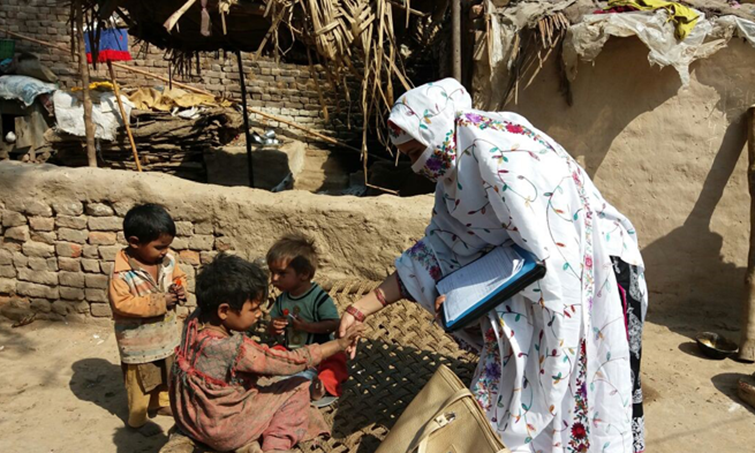
By Saeed Ahmed
Multan March 10: Communication network, commonly known as CommNet seems to have brought about a 360 degree turn around in South Punjab by curtailing refusals to zero and ensuring polio vaccination of 100 % high risk mobile population (HRMP) in the region.
“We have recruited local female staff members to do two basic things; i.e. raise awareness about the personal health and hygiene and mobilize local communities to ensure that herd immunity is achieved through collective responsibility,” said CommNet Coordinator for the area Umer Feroz.
There are 11 districts falling under 3 divisions of Multan, Bahawalpur and D G Khan which form a block known as South Punjab. CommNet was introduced about five years back in five of the eleven districts in the region where persistently missed children were being reported due to refusals of the parents and caregivers.
Polio program data centres reveal that in the concerned five districts 3.5 million children are registered for vaccination during monthly campaigns. Out of these districts nearly a thousand children were being reported missed during one or repeated campaigns. The children identified were living in 34 Union Councils (UCs) across these five districts. The overall figure of missed or consistently missed children might seem very little, but due to congested settlements and close-knit social and physical structure of the cities, even one child missed remains a big threat for the rest of the children, said that CommNet Coordinator.
“People frequently moving around within districts, regions and provinces are known as high risk mobile population (HRMP), because they are seen as potential carriers of virus,” informed Focal person for District Polio Control Room Multan, Babar Sharif.
South Punjab, being the pivot for transitioning populations from FATA, Southern districts of KP, Eastern Balochistan and Northern Sindh as over 100 thousand people transit, visit or come to settle in one the districts of South Punjab on a frequent basis. The data centres have done trend analysis to see that these migrations happen around harvesting, cultivation or harsh winter seasons. These trends have also been monitored by the program leadership to find out that how many of them are seasonal workers, nomads or Pashtuns who come to these settled districts in search of livelihood or to avoid harsh winters of FATA and Balochistan.
“Majority of these moving populations are categorized into three main categories; i.e Pashtuns, nomads and economic labour class,” apprised Babar Sharif who is closely monitoring HRMP coverage in the region.
At the start of 2016, there were 776 children whose parents had refused vaccination within marked UCs while the overall coverage of polio vaccination was reasonable, yet the persistently missed children coupled with migratory population, risks of these missed children were considered very high by the leadership of the program at provincial and federal level.
National Emergency Action Plan (NEAP) 2016-17 asks for 95 % coverage to ensure that active transmission of the virus is interrupted and ultimately wiped out.
CommNet teams, comprising of mostly female local members of the community, have proactively combed the areas to update micro-plans, list down the continuously missed children, refusals and even silent refusals in the past one year. Result is that only in Multan, there were more than 223 refusals recorded amongst Pashtuns and Nomads but for the past four campaigns, not a single refusal has been recorded from any of seven UCs of the entire district.
Similarly if we look at the latest figures collected from districts D G Khan it is equally encouraging to see that in 10 highly concerned UCs, 151 reported refusals and over 100 silent refusals have not only been converted into active recipients but even advocates of polio drops in their respective communities. “Silent refusals were those who were pretending that they have vaccinated but were in fact refusing to vaccinate due to rumours spread by openly refusing families,” informed Asim Bhutta a district health and communication support office in Multan.
